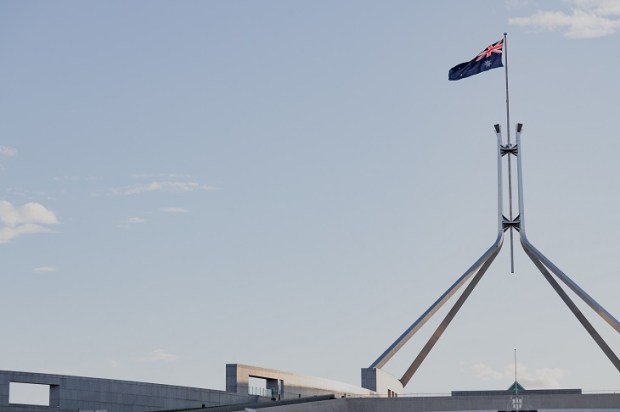On May 24, a large number of protesters gathered in front of the ACT Legislative Assembly to rally against the state government’s decision to acquire the private healthcare facility known as Calvary Hospital. The hospital is one of two major healthcare centres in Canberra, and has 130 years of compassionate service to its name. According to lawyer John Steenhof, from the Human Rights Law Alliance, the ACT government failed to adequately consult the public on its planned acquisition, defying the ‘on just terms’ requirement for acquisitions as enshrined in section 23(1)a of the Australian Capital Territory (Self-Government) Act 1988. According to the Act, ‘The assembly has no power to make laws with respect to the acquisition of property otherwise than on just terms.’
The surreptitious and speedy manner by which the ACT government has so far managed the proposed acquisition indicates this matter is anything but ‘just’. In my opinion, it is downright unlawful unless the government can prove the acquisition is occurring on ‘just terms’. For something to be deemed just, it must be done with common-sense reasoning, logic, be mindful of the Constitution and the democratic framework of a nation, and ensure the advantages would outweigh the disadvantages…
Is this the case for Calvary Hospital? It hardly seems so.
The lack of a paediatrics unit, abortion and euthanasia facilities, and the spare beds available in Calvary have been touted by locals as the major reasoning behind the government’s planned takeover. The fact of the matter is, the government has a wide range of powers it could use to implement the aforesaid concerns without the total acquisition and re-establishment of a private healthcare facility that currently operates exceptionally, and is praised by several locals as being a much better alternative to state healthcare. Taxation was designed to be used justly, for the democratic and good governance of society, not to annihilate its essential aspects and private institutions, only to rebuild it under broader and unwanted state dictatorships. Furthermore, Calvary embodied one of the few ‘state alternatives’ to healthcare, in which case its acquisition would relinquish any democratic semblance of choice practitioners and patients would have experienced through its existence.
Jeremy Hanson of the Liberal Party has also been vocal on this issue, having vehemently defended Calvary in attendance at the protest. He deems the ACT government’s proposed acquisition as ‘heist legislation’ which contains sentiments to call the police and take the venue by force, should Calvary fail to hand itself over. Hanson also criticised the Labor Party for calling the matter ‘urgent’ to speed legislation across the line. It is not ‘urgent’ according to Hanson, who also commended Calvary’s healthcare for being of a remarkably high standard.
Another issue the doctors and nurses at Calvary face is their coercion into silence, as they may not speak up due to the reality many are to be re-employed by the state, after the acquisition, should it succeed. There is currently a healthcare staffing crisis in Canberra, indicating the acquisition is unjustified as acquisitions take time, and patients in desperate need of healthcare, die in the meantime.
The Belco Party has also been fighting the acquisition, with Jason Taylor, the candidate for Yerrabi, stating, ‘The manner and speed at which this takeover is occurring is frankly unnecessary and raises many questions and concerns.’
In ‘reading between the lines,’ members of the public are concerned that the state’s motivations are ‘anti-faith’ driven. Australian Christian Lobby’s Wendy Francis, having been consulted in the process of the acquisition as a political Christian advocate, is concerned that ACT’s legislation marks the beginning of the end of ‘freedom of conscience’ within Australia. Francis stated, ‘Calvary Hospital is life-affirming from conception to natural death. Its failure to provide elective abortions and euthanasia is an affront to the ACT Labor-Green’s government which is now attempting to crush dissent with its rushed compulsory acquisition.’ If the acquisition succeeds, the clinic will ultimately be forced to provide healthcare services it has so far avoided, such as abortions. Many of the staff to be re-employed would therefore face serious ‘freedom of conscience’ issues if they are forced into departments and services they wanted to work in. Francis is also concerned by the precedent the legislation would set for other privately run institutions, including education.
It appears that the ACT government has a lot of explaining to do, as to why it wished to ram the legislation through Parliament, effectively avoiding public submissions and scrutiny. What does the government have to hide? And why is it hell-bent on acquiring private institutions, which operate exceptionally, and offer both patients and workers the opportunity to thrive in places that provide much-needed democratic diversity in our times.
Not only are religious people livid with rage over such gross government overreach, but the acquisition has many private business owners deeply concerned. On the May 31, the legislation was passed through the ACT Parliament. Anthony Albanese is not expected to intervene to stop the acquisition, at the federal level, leaving a large number of Australians concerned over the tentacular and ever-growing government reach into the private sector.
























